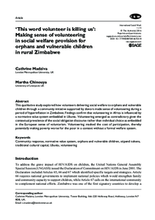This qualitative study explored how volunteers delivering social welfare to orphans and vulnerable children through a community initiative supported by donors made sense of volunteering during a period of hyperinflation in Zimbabwe. Volunteering emerged as contradictory given the contextual prevalence of the social obligation discourse rather than individual choice as embedded in the European sense of volunteerism. Volunteering masked the cost of participation, thereby potentially making poverty worse for the poor in a context without a formal welfare system. Volunteers often felt a sense of loss as they sometimes sacrificed work to take care of the needs of children.
This study was conducted between 2006 and 2011 within a community based organization which operated in Buhera South District of Zimbabwe. The study was aimed at understanding responses to orphans and vulnerable children supported by International NGOs through development partnerships. A total of 22 participants took part in the study, which included 14 volunteers, 2 staff from INGOs and 6 staff from community-based organizations. Volunteers were asked their motivations. These motivations included religion, reciprocity, respect, and social obligation.
The study determined that volunteering in sub-Saharan Africa is underpinned by a value system embedded in Ubuntu. This suggest that volunteering is done more out of social obligation rather than individual choice as seen in European settings.

